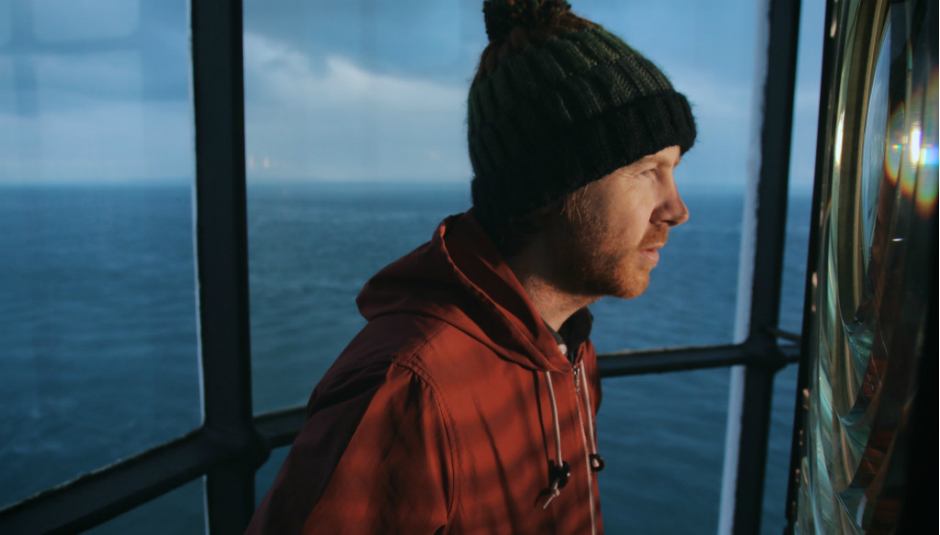A musician whose carefully-crafted music stems from the same gossamer-like realm of the Beatles and Elliott Smith at their most candid, Stephen Scullion of Belfast three-piece Malojian is a master of writing songs about inner spaces and places that marry quiet respite with a triumphant spirit. Ahead of the release of his band's exquisite fourth studio album, Let Your Weirdness Carry You Home, we talk to Scullion about the craft of songwriting, embracing one's eccentricities, working with Steve Albini, reinvention, and more.
DiS: Hi, Stephen. You’ve released your fourth album, Let Your Weirdness Carry You Home. That’s an interesting title. Tell us more about that.
Stephen Scullion: I have a couple of kids so I was thinking of a way to tell them it’s ok to be weird and that sometimes it’s the weirdness that makes us cool and unique. Sometimes I’ll start lyrics before even figuring out what I’m trying to get across, but with this one I had a clear aim that it should be an uplifting and positive message.
This album is a million miles away from recording your previous album, last year’s This Is Nowhere, with Steve Albini at Electrical Audio. Was it a conscious decision to do something completely different on this occasion?
The idea with This Is Nowhere was to capture the sound of the band as live as possible and that was a great thing to do, but at the end of it I definitely felt a bit deflated. It was recorded in four days and I really love being in the studio so I was sad that it was over so quickly. So I wanted to take more time over this one and enjoy messing around with sounds and stuff.
You’ve got some illustrious names on board, from Gerry Love to Joey Waronker. What impelled you to branch out into collaborative territory this time around?
I’ve always collaborated on my stuff but just this time the other people were some of my musical heroes. The first song I ever sang on stage was a Teenage Fanclub song so having Gerry Love on the album is unreal. We supported them last year in Dublin and I had been in contact with Gerry because of that, so I just asked him one day if he’d be interested and sent him over some tracks. He knows Joey actually, because Teenage Fanclub supported REM on an American tour, so I think that was probably a big factor too. Joey was the first big name to come on board. I was downloading some of his drum loops and samples and took a notion, found a contact for him and sent off an email. A few days later he emailed me saying he was interested. Nuts! I think the fact that I had just worked with Steve Albini probably helped to pique Joey’s interest.
The album is notably experimental and full-blooded compared to some of your more carefully-crafted and subtle work. What influenced the decision to take this approach this time around?
I didn’t make a conscious decision to be more experimental or anything, so I think just the fact that I was in my own studio, not watching the clock and loving what I was doing, maybe added something to the sound. Plus everyone who played on the album brought something really cool to it.
Also, a lot of the time I would be waiting until the kids went to bed then working late into the night so I think that probably added something too. I love working at night.
You’ve said that you recorded demos here with the intention of fleshing them out on the studio. Did that happen, or did you run with a “first thought, best thought” sort of mindset?
For the most part I just went with the demos and embellished them where necessary. Maybe one track I can think of where I had to record a few versions before it felt right. It was strange because I would have something that really didn’t seem proper or correct but I loved the sound of it and I had to make a call about whether or not to send it over to Joey, who has played on countless massive albums and been in some of the best studios in the world etc. etc. So I think having worked with Albini and the fact that this is my fourth album helped me in that respect, where I had the confidence to go with my gut. Joey actually said a few times that he loved that we weren’t trying to make “hits” or go for a certain sound etc. so hopefully that will translate to the listener.
You've released four studio albums in less than three years. Where does that level of productivity stem from?
I think it’s probably a bit more than that if you count from when I started working on the first album. I have a back catalogue of songs to get through so every album I’ll maybe bring 2 or 3 older songs in and then try to write new ones to keep it feeling fresh. I really love recording and even putting all the artwork and stuff together so I think as long as I’m able, I’ll try to do an album every year or at least every 2 years. The only downside to it all is having to then “sell” it which I find to be a struggle and a bit stressful.
Over the years you’ve won many plaudits from critics both at home and abroad. But how has it been trying to continually evoke that interest being somewhat cut off from what’s “happening” in the mainland?
For the most part, I don’t think about it. I’m just trying to write songs and make albums that I can be proud of. If I start to think about PR and all that side of the business, I find I start to get depressed and stressed out, so I largely avoid it.
Let Your Weirdness Carry You Home captures your craft at its very best. What are your plans for getting it out there over the next few months?
We have some shows lined up around Ireland, then next year there’s talk of tours in Germany and Canada so far, plus more dates around home. Also, a large part of this project was based around working with Northern Ireland Screen and the British Film Institute’s Digital Archive, so some of the shows will include visuals by Colm Laverty. Colm has also made a video for every song on the album, so there’s a full visual companion to it. I’d say we’ll probably try to do something with that too.
Let Your Weirdness Carry You Home is out now via Rollercoaster Records.
Photo Credit: Colm Laverty






















